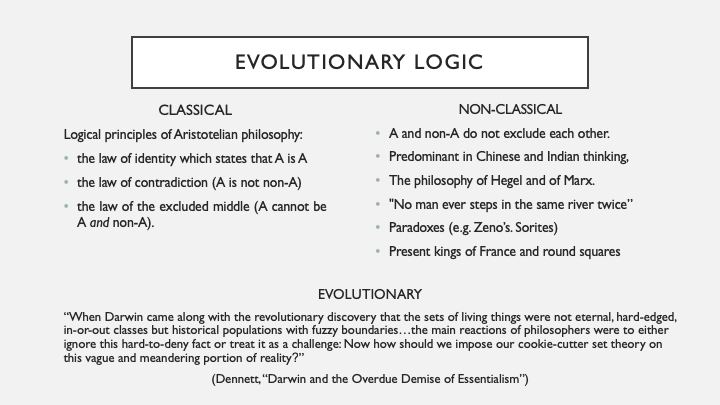Logic
"Classic logic works in a static universe, but ours is dynamic."
On my Philosophy 101 page, I wrote that logic is the study of reasoning. Logic is often divided into two parts: inductive reasoning and deductive reasoning. The first is drawing general conclusions from specific examples, the second is drawing logical conclusions from definitions and axioms.
So far, this is the least developed section of evolutionary philosophy and will probably require great technical effort to move further. What I said in my lecture about what humanism can learn from evolution is that classical logic is built on three laws — the law of identity (A is A), the law of contradiction (A is not non-A), and the law of the excluded middle (A cannot be A and non-A). These are all valid and true when examining a static picture. But as soon as time and evolution enter the picture, the hard lines become blurry and eventually erased. This quote from Dan Dennett’s paper "Darwin and the Overdue Demise of Essentialism” helps illustrate this perfectly:
So far, this is the least developed section of evolutionary philosophy and will probably require great technical effort to move further. What I said in my lecture about what humanism can learn from evolution is that classical logic is built on three laws — the law of identity (A is A), the law of contradiction (A is not non-A), and the law of the excluded middle (A cannot be A and non-A). These are all valid and true when examining a static picture. But as soon as time and evolution enter the picture, the hard lines become blurry and eventually erased. This quote from Dan Dennett’s paper "Darwin and the Overdue Demise of Essentialism” helps illustrate this perfectly:
|
“When Darwin came along with the revolutionary discovery that the sets of living things were not eternal, hard edged, in-or-out classes but historical populations with fuzzy boundaries … the main reactions of philosophers were to either ignore this hard-to-deny fact or treat it as a challenge: Now how should we impose our cookie-cutter set theory on this vague and meandering portion of reality?”
|
How indeed. That’s something I’d still like to develop with some explorations of non-classical logic using an evolutionary eye. But as a preview, this will probably revolve around using appropriate perspectives. For example, Tinbergen's four questions gives us current static views on functions and mechanisms, as well as shifting historical perspectives on ontogeny and phylogeny. That’s a holistic view. And something like that is what I think might play a part in evolutionary logic as well. All the classic rules will remain useful. They just need to be used appropriately (in static pictures) and supplemented elsewhere (over dynamic timeframes). I believe several classic paradoxes (e.g. Zeno's, Sorites', and Buriden's) can be solved in this way.
For now, the best way to explore the beginnings of this branch of evolutionary philosophy is to read the summary section on logic in the essay on What I Learned From 100 Philosophy Thought Experiments.
Further Reading
For more details on evolutionary logic, here are some other essays I have written:
- The summary section on logic in What I Learned From 100 Philosophy Thought Experiments.
- Each individual thought experiment from that series that dealt with logic:
- #42 Take the Money and Run
- #6 Wheel of Fortune
- #70 An Inspector Calls
- #64 Nipping the Bud
- #49 The Hole in the Sum of the Parts
- #85 The Nowhere Man
- #16 Racing Tortoises
- #94 The Sorites Tax
- #61 Mozzarella Moon
- #24 Squaring the Circle
Subscribe to Help Shape This Evolution
© 2012 Ed Gibney

